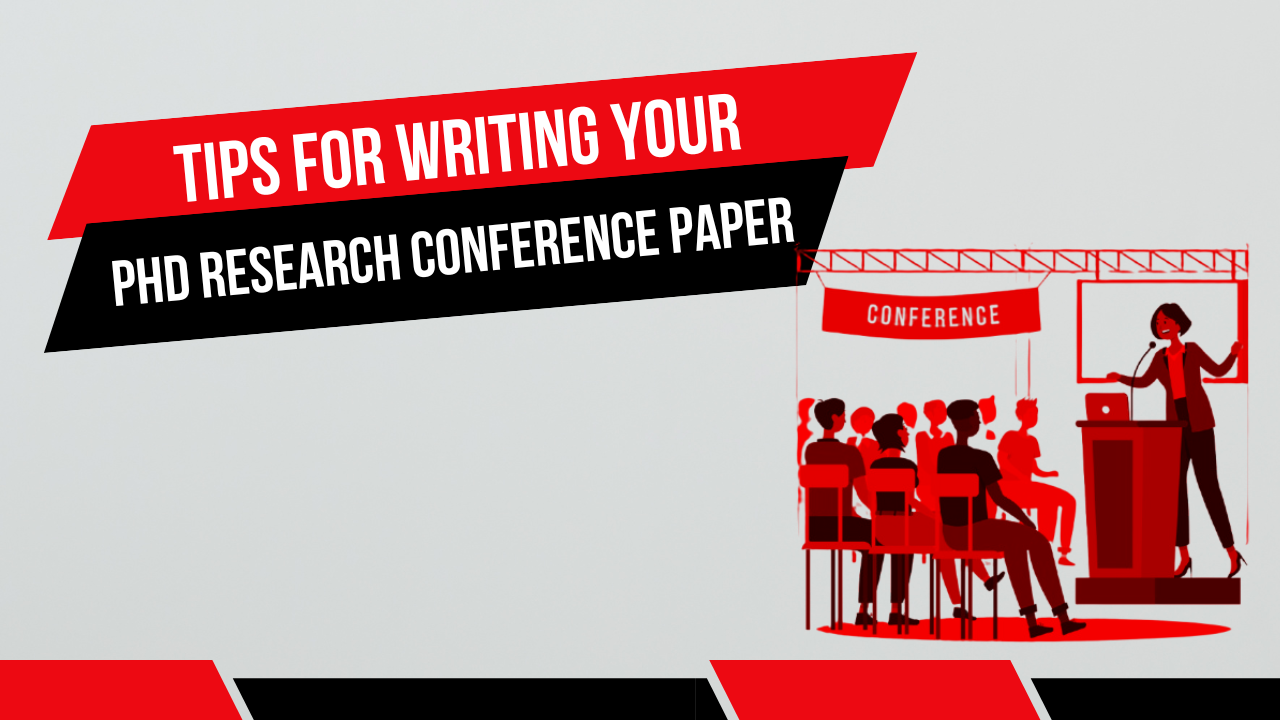12Jun

Presenting your research at academic conferences is one of the most exciting and important steps in a PhD scholar’s journey. But before you captivate your audience with slides and insights, everything begins with a well-written PhD Research Conference Paper. Whether you’re submitting your PhD Research Conference Paper for a national academic conference or an international symposium, your writing needs to be concise, scholarly, and persuasive. In this detailed guide, we’ll walk you through essential tips for writing your PhD research conference paper, from planning and structure to language and formatting.

Writing a PhD research conference paper isn’t just about getting published in the proceedings. It’s an opportunity to:
With so much riding on one paper, it’s vital to get it right.
Before you start writing, carefully read the conference guidelines. Most conferences have strict requirements for:
Following these instructions is non-negotiable. A great paper that ignores formatting rules can be rejected outright.
Conference papers typically highlight original research, case studies, theoretical contributions, or methodology advancements. Choose a topic that:
If your PhD research is still ongoing, focus on interim findings or novel approaches that can provide value even before final results are available.
The abstract is often the first—and sometimes only—part people will read. Make it count.
Tips for writing your abstract:
Use clear, compelling language. A strong abstract improves your chances of getting selected and cited.
A well-structured paper is easier to read and understand. Here’s a classic structure for most PhD research conference papers:
Clear, concise, and reflective of your content.
A summary of the entire paper.
Conference papers are not dissertations. You need to compress your research into a digestible form. Focus on:
Aim for clarity and brevity, not verbosity. Less is more.
Tables, graphs, charts, and diagrams can:
Tips:
Remember: A good figure can say more than a page of text.
First drafts are never perfect. After writing, take time to:
Ask your PhD guide or peers to review your paper. A fresh set of eyes can spot flaws you missed.
Use up-to-date and relevant references. Don’t overload your paper with unnecessary citations. Also:
Proper referencing reflects academic integrity and enhances your paper’s credibility.
If your paper will be accompanied by a presentation:
This ensures a smooth transition from paper to podium.
Late submissions are typically rejected without consideration. So:
Here are a few advanced tips to give your PhD research conference paper an edge:
Focus on Contribution
Make your original contribution obvious. Reviewers look for what’s new or useful in your work.
Highlight Keywords
Choose the right keywords—they help your paper appear in searches and indexing.
Don’t Oversell
Avoid exaggerated claims. Be honest about your research limitations and what you plan to improve.
Engage With Prior Work
Cite landmark studies and ongoing debates in your field. Show that you know the landscape.
Prepare for Questions
If your paper gets accepted, you’ll likely present it. Be ready to explain and defend your work confidently.
Writing a PhD Research Conference Paper is more than just a writing task—it’s a strategic step in building your academic reputation. By following these expert tips and tailoring your PhD Research Conference Paper to the conference’s expectations, you increase your chances of acceptance and academic recognition. If you’re feeling overwhelmed, don’t worry—it gets easier with practice. And remember, every great presenter once started with a rough first draft.
Kenfra Research understands the challenges faced by PhD scholars and offers tailored solutions to support your academic goals. From topic selection to advanced plagiarism checking.

Starting the literature review section of your research paper, can be challenging, as it requires not only summarizing existing research... read more

In any research study or data-driven project, handling missing data in your dataset is a crucial step that can significantly... read more

When you begin your research or PhD journey, one term you will hear everywhere is Journal Indexing. Whether your target... read more

Top Research Paper Writing Consultants in Chennai and India. Kenfra Research provides comprehensive research paper writing assistance. read more

How to Easily Pursue a PhD in India: A Step-by-Step Guide read more

IP University Admission 2026 updates are out. Guru Gobind Singh Indraprastha University (GGSIPU), also known as IP University (IPU), has... read more
Building Your Engineering PhD in India: Unleash Your Research Potential with Kenfra Research Aspiring PhD scholars in engineering in India,... read more

Journal manuscript writing tips Publishing research in academic journals is a significant milestone for any researcher. Whether you're an... read more
Researchers turn excavated soil into sustainable mortar IntroductionThe conversion of excavated soil into sustainable mortar represents a significant advancement in environmentally... read more
WhatsApp us
Leave a Reply